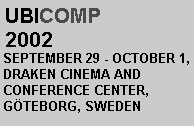 Home Home
Call for Participation
Program
Outcome
Participants
Organization 
|
Introduction
ALL Presentations and Papers are Available Online on
the Program Page!
Ubiquitous Computing seeks to move computers into the background while using
them to enhance human endeavors. Nevertheless, will society accept and
totally trust the security associated with background computational activities?
Are there new security threats to person and property as a consequence of this
successor to interactive computing? Can we seamlessly leverage current/
classical security concepts and solutions to an augmented world? Ubiquitous computing security research may
still be considered a "hot topic", as there still remain some open
questions. This workshop contributes to this field by bringing
together professionals prepared to address and brainstorm over essential themes
related to ubiquitous computing security including:
- Ubiquity - Who has access to my resources and
services? Issues for confidentiality, authorization, and access control.
- Augmented Reality – How do we augment our
risk management strategies to match augmented reality? Furthermore, can we
exploit augmented reality in risk management?
- Context Awareness - Who else knows where I am
and what’s going on around me? Matters for privacy and controlled
information access including and beyond location.
- Invisible Computer - Who am I interacting with
and when? Defining suitable authentication and trust frameworks for ubiquitous
computing.
- Smart Items - But they’re so small, can they
protect themselves and who owns these things anyway? Analysis and
classification of existing micro crypto-algorithms, as well as issues
surrounding ownership, accountability, and non-repudiation.
- Mobility and Portability – What happens to
“end-to-end” security? Charting of IT landscapes and architectures
representative of ubiquitous computing, and specification of goals for
security.
- Security versus the Disappearing Computer – How do we manage
the tradeoffs presented here? How are the novel disappearing computer
interaction substrates maintained when security is introduced?
- Management of Augmented Environments –
Identification of the management issues for ubiquitous systems and proposals
for tools and utilities.
- Social Awareness, Legislation and Education
– Agreement on what message is to be delivered to society regarding security
in ubiquitous computing environments, and how.
Expected Participants
- Researchers in Ubiquitous Computing Security will have an opportunity to
exchange ideas with other active researchers in this field.
- Seasoned experts in Classical Security may transfer their expertise to the
UbiComp domain of security research.
- Software and hardware engineers of ubiquitous, mobile and embedded systems
can contribute to discussions regarding real applications and the
feasibility of proposed security solutions. They will also be involved
in generation of further ideas for incorporating security into the design
process.
- Social Computing practitioners will assist in maintaining a balance
between technical issues and security requirements for society.
- Business visionaries will also add their expectations for Enterprise-level
Ubiquitous Computing applications.
Application of Outcome
- Presentation of outcome to UBICOMP2002
participants
- Towards a reference model for Ubiquitous Computing
Security
- Specification of future work in the area of Ubiquitous Computing
Security
- Further Publication of Workshop outcome
Contacts
Refik Molva
Institut Eurécom
2229 Route des Crêtes, BP
193, F-06904 Sophia Antipolis
Cédex Phone: +33 (0)
4.93.00.26.12
email: molva@eurecom.fr
http://www.eurecom.fr/Corporate/Staff/molva.html
Joachim Posegga
SAP Corporate Research
Vincenz-Priessnitz-Str. 1,
D-76131, Karlsruhe
Phone: +49 721 69020
email: joachim.posegga@sap.com
http://www.teco.edu/~posegga/
Philip Robinson
SAP Corporate Research
& Tele-cooperation Office (TecO)
Vincenz-Priessnitz-Str. 1,
D-76131 Karlsruhe
Phone: +49 721 690289
email: philip@teco.edu
http://www.teco.edu/~philip/
|
 Home
Home
